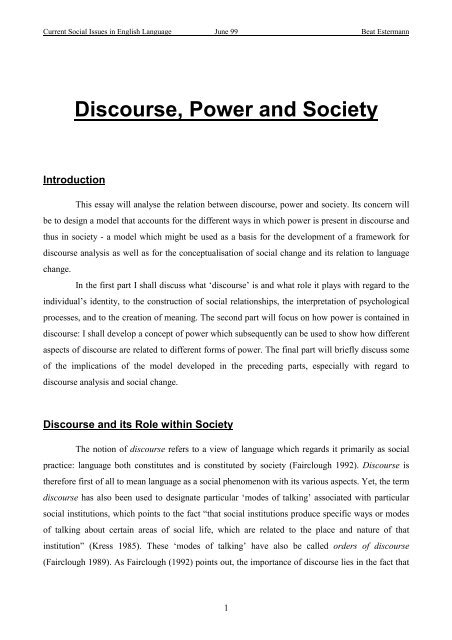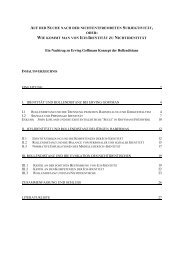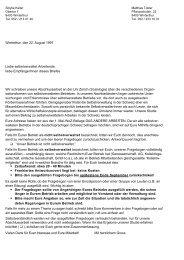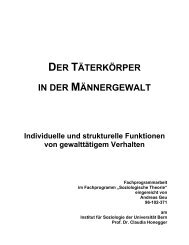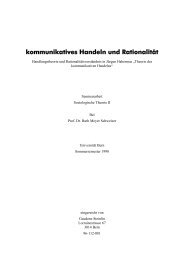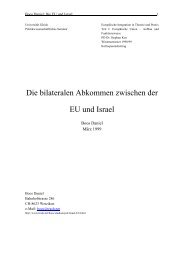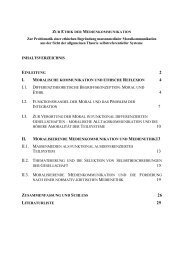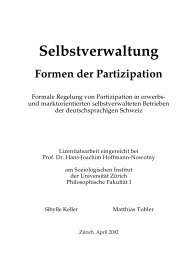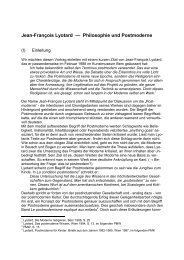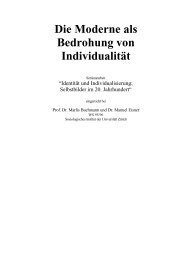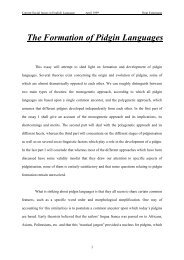Discourse, Power and Society
Discourse, Power and Society
Discourse, Power and Society
Create successful ePaper yourself
Turn your PDF publications into a flip-book with our unique Google optimized e-Paper software.
Current Social Issues in English Language June 99 Beat Estermann<strong>Discourse</strong>, <strong>Power</strong> <strong>and</strong> <strong>Society</strong>IntroductionThis essay will analyse the relation between discourse, power <strong>and</strong> society. Its concern willbe to design a model that accounts for the different ways in which power is present in discourse <strong>and</strong>thus in society - a model which might be used as a basis for the development of a framework fordiscourse analysis as well as for the conceptualisation of social change <strong>and</strong> its relation to languagechange.In the first part I shall discuss what ‘discourse’ is <strong>and</strong> what role it plays with regard to theindividual’s identity, to the construction of social relationships, the interpretation of psychologicalprocesses, <strong>and</strong> to the creation of meaning. The second part will focus on how power is contained indiscourse: I shall develop a concept of power which subsequently can be used to show how differentaspects of discourse are related to different forms of power. The final part will briefly discuss someof the implications of the model developed in the preceding parts, especially with regard todiscourse analysis <strong>and</strong> social change.<strong>Discourse</strong> <strong>and</strong> its Role within <strong>Society</strong>The notion of discourse refers to a view of language which regards it primarily as socialpractice: language both constitutes <strong>and</strong> is constituted by society (Fairclough 1992). <strong>Discourse</strong> istherefore first of all to mean language as a social phenomenon with its various aspects. Yet, the termdiscourse has also been used to designate particular ‘modes of talking’ associated with particularsocial institutions, which points to the fact “that social institutions produce specific ways or modesof talking about certain areas of social life, which are related to the place <strong>and</strong> nature of thatinstitution” (Kress 1985). These ‘modes of talking’ have also be called orders of discourse(Fairclough 1989). As Fairclough (1992) points out, the importance of discourse lies in the fact that1
Current Social Issues in English Language June 99 Beat Estermannit contributes to the construction of ‘social identities’, to the structuring of ‘social relationships’, aswell as to the creation of systems of knowledge <strong>and</strong> belief.<strong>Discourse</strong> plays a primordial role in the constitution of an individual’s identity <strong>and</strong> selfunderst<strong>and</strong>ing,for it is only “through social interaction, <strong>and</strong> in particular verbal interaction”, that weconstruct a self-image (Watts 1991, p. 54). In an ever-ongoing dialogue with their socialenvironment individuals draw upon existing discourses in order to shape their identity, theirinterests, <strong>and</strong> their social positions. A person’s identity does not exist a priori, but has to beconstructed <strong>and</strong> enacted continuously in order to be sustained (Cameron 1995, West <strong>and</strong>Zimmerman 1987 cited in Uchida 1992). Personal identity is not a fixed construct, but a continuingperformance, <strong>and</strong> social ‘codes’ according to which particular identities are represented change overtime. Thus, as Cameron points out, “the way gender is enacted on the surface through conventionsof dress, bodily demeanour <strong>and</strong> social interaction has altered dramatically over the past twentyyears” (Cameron 1995, p. 169). Such changes are the product of a dialectic process, for neither areindividuals completely free to create their identities independently from already existing socialstructures, nor remain social structures unaffected by the individuals’ choices.It has been pointed out that personal discourse is shaped by society <strong>and</strong> that social roles arelearned during childhood. This is reflected in Andersen’s role-play study where children, aged 4 to7, appeared to become more <strong>and</strong> more sensitive to social roles as their age increased (Ervin-Tripp etal. 1984). As Kress (1985) points out, individual speakers will primarily reproduce the discoursethat they have previously learned. However, there is a number of different <strong>and</strong> often contradictorydiscourses at h<strong>and</strong>, providing speakers with a certain degree of choice, which enables them to shapeat least partly their identities <strong>and</strong> social positions. One reason why personal identities are none theless largely determined by society lies in the fact that members of society behave in accordance withcountless rules, which, widely unreflected, constitute their “practical consciousness” (Davis 1988, p.79). Yet, it is only after such unreflected knowledge of the world is made explicit <strong>and</strong> isincorporated into our “discursive consciousness” (ibid.) that we can make a conscious choice withregard to our personal <strong>and</strong> social identities, <strong>and</strong> only insofar as we are able to shape our identityconsciously is it possible for us not merely to reproduce a given social order, but to shape itaccording to our own preferences - preferences, which however will never be completelyindependent from our social environment.This social environment, in which we live <strong>and</strong> with which we constantly interact, isconstituted by a number of social networks <strong>and</strong> categories to which we belong <strong>and</strong> which weidentify with. Social networks <strong>and</strong> categories are generally sustained by particular discursive2
Current Social Issues in English Language June 99 Beat Estermannpractices which fulfill a double function: on one h<strong>and</strong> they represent the world “in a way that blursdifferences, antagonisms [<strong>and</strong>] conflicts of interests”, thus playing an integrative role among [group]members; on the other h<strong>and</strong> they express the common interests <strong>and</strong> the distinctive characteristics ofthe group against other interests or particularities by exacerbating difference, hostility <strong>and</strong>superiority (cf. Hodge <strong>and</strong> Kress 1993). Thus, each group has its own discursive practices orideology which, through collectively shared images <strong>and</strong> representations, co-ordinates the actions<strong>and</strong> world-view of its members (Thompson 1984). One aspect of group integration is the creation ofa common classification system, which has an impact on structures of thought <strong>and</strong> feeling, <strong>and</strong> thuson the way group members conceive of the world (Hodge <strong>and</strong> Kress 1993, Lee 1992). However,ideologies structure society not only by defining social groups against other, often competinggroups, but also by according their members a particular place within the social framework. Thisstructuring effect of ideology is realised both in discourse <strong>and</strong> through discursive practice: withinevery social network ideas are sustained concerning the way different members of the network areexpected to act, to speak <strong>and</strong> the position they are supposed to occupy within the group; at the sametime group members constantly actualise their roles, either tacitly abiding by the rules present intheir social environment or trying to challenge at least some of them <strong>and</strong> thus modifying the currentideology (cf. Moreau 1981). This dynamic concept of ideology, however, according to whichideological complexes are subject to constant modification, has a number of implications that areworth discussing.First, I have tacitly assumed that there is not a social system, but a myriad of socialnetworks, groups <strong>and</strong> categories which are all sustained by ideology. The social sphere isfragmented, “‘society’ as a unitary <strong>and</strong> intelligible object [...] is an impossibility” (Laclau 1983,p.22, quoted in Clegg 1989). Rather, it consists of an infinitude of individuals who, though theymight have a range of things in common, are nevertheless all quite different from each other.Through the working of ideology, however, some of these differences are downplayed while othersare given excessive significance. Thus, a social structure is created “on the basis of closure, of thefixation of meaning, of the non-recognition of the infinite play of differences” (ibid., p.24).Second, assuming that the social sphere is fragmented, we also have to postulate afragmentation of the ideological: the various social networks which constitute the social systemhave all their own particular ideologies, which, drawing upon different types of discourse, integratetheir members, provide them with specific roles, <strong>and</strong> distinguish them from other groups. However,due to overlapping networks <strong>and</strong> to the arbitrariness on which socially relevant distinctions are oftenbased, it is quite common for individuals to be confronted with competing or inherently3
Current Social Issues in English Language June 99 Beat Estermanncontradictory ideologies. Black people, for example, might be compelled to adopt ‘white’ speech inorder to improve their status within British society, being at the same time expected to assert theirallegiance to the Black community by using ‘black’ features (Dalphinis <strong>and</strong> Nwenmely 1991).Similarly, women engaged in politics have been confronted with the dilemma that after loweringtheir pitch in order to gain authority they were criticised for their loss of femininity, which in turnwas detrimental to their authority (Cameron 1995).Furthermore, we have to acknowledge that, given a number of competing ideologies, wecan only adopt a relativistic view of truth, for each ideology produces its own particular ‘truth’. Asobservers we can never free ourselves from the working of ideology. Therefore, as Frow puts it, atheory of ideology shall not “assert a relationship of truth to falsity (<strong>and</strong> so its own mastery overerror) but concern rather the production <strong>and</strong> the conditions of production of categories <strong>and</strong> entitieswithin the field of discourse” (Frow 1985, p.203). According to Foucault, analysing ideologyconsists of “seeing historically how effects of truth are produced within discourses which inthemselves are neither true nor false” (Foucault 1980, p.118). And even Thompson, refusing todiscard the critical conception of ideology, concedes that “[t]he critique of ideology is necessarilypartial, fragmentary, incomplete; [that it] can never be conducted from a position outside of thehistory <strong>and</strong> the society to which we belong” (Thompson 1984, p. 188).So far the focus has been on the relationship between individuals <strong>and</strong> their socialenvironment. Yet, we are engaged in an ongoing dialogue not only with our social environment, butalso with our psyche. In analogy to the way discourse serves us to structure the events of the outerworld, we draw upon discursive forms in order to conceptualise our sensual <strong>and</strong> mental experience.Thereby language serves as a filter. It does not readily lend itself to the expression of any possibleexperience, for, as a result of its classificatory function, language is always somewhat imprecise,somewhat biased. As Cameron notes, “[t]he fit between experience <strong>and</strong> language is never exact,since words themselves are not exact, nor is the fit between speakers’ <strong>and</strong> hearers’ interpretations”(Cameron 1985, p. 193). This leads us yet to another problem: utterances do not transfer meaningsbetween people. Rather they produce meaning through their interaction with a set of conceptualstructures within our minds (Lee 1992). These conceptual structures are personal, <strong>and</strong> in the sameway as different social groups may create their specific types of discourse, we all rely on some sortof personal discourse: the fragmentation of the social is perfect. However, the alienation amongindividuals, which results from this fragmentation, is disguised through the working of ideology,which, as we have already seen, over- <strong>and</strong> underemphasizes differences. Yet, this is notunproblematic, for, far from being an exclusively integrative force, ideology provides every social4
Current Social Issues in English Language June 99 Beat Estermannorder with its outcasts. The only way to overcome this negative effect of ideology is to becomeaware of its functioning: to become aware of the fact that some groups within our society aretrapped in a dilemma (e.g. women or Black people as mentioned above), to become aware of thelinguistic incongruities between different cultures (Roberts et al. 1992), to recognise the irrationalitywith which certain linguistic varieties are stigmatised (Trudgill 1975), to see how we unconsciouslyadjust our way of speaking to particular speakers while we dislike other speaker’s accent, <strong>and</strong> soforth. In the end, however, this awareness of the working of ideology comes down toacknowledging our own being different, <strong>and</strong> thus to an emancipation from society. Thisemancipation - Jung called it ‘individuation’ - is accompanied by the integration of parts of the‘unconscious’ into our ‘conscious’ (Jung 1960), or, to use Davis’ (1988) terms, by thetransformation of ‘practical consciousness’ into ‘discursive consciousness’, in a process which isvery similar to the hermeneutic cycle described by Thompson (1984) in his attempt to come to gripswith ideology.Whether discourse is drawn upon to create individual identities, to establish social order,or to conceptualise mental processes, it is always related to the construction of meaning. As Hodge<strong>and</strong> Kress observe, “meaning does not exist outside discursive <strong>and</strong> semiosic [sic] processes” (Hodge<strong>and</strong> Kress 1993). It serves to maintain social structures, <strong>and</strong> therefore to sustain relations ofdomination, <strong>and</strong> it provides our actions with some signification (Thompson 1984). In short,discursive practices that are integrated into the dominant ideology of our social sphere areconstitutive to the construction of reality (Fairclough 1992). However, we are in general not awareof the constructedness of our reality, <strong>and</strong> if we were, it would be impossible to think of somealternative reality which would appear less constructed. According to Althusser, “ideology is not adistorted representation of real relations but rather a real relation itself, namely the relation throughwhich human beings live the relation to their world” (cited in Thompson 1984, p. 90). And asFairclough points out, ‘common sense’, i.e. all these things which we have always taken for granted,“is substantially, though not entirely, ideological” (Fairclough 1989, p. 84).<strong>Discourse</strong>, <strong>and</strong> therefore ideology, are social constructs, in the production of which allmembers of society have a share. Yet, to assume that conversational resources are equally availableto all participants would mean to neglect the fact that certain individuals or groups of individuals“have greater scope for action <strong>and</strong> choice than other individuals or groups of individuals”(Thompson 1984, p. 170); it would mean to fail to notice that resources in our society areasymmetrically distributed (Davis 1988). For in merely every social context we can identifydominant <strong>and</strong> ‘muted’ groups: men <strong>and</strong> women in politics (cf. Cameron 1995), locals <strong>and</strong> foreigners5
Current Social Issues in English Language June 99 Beat Estermannat the workplace (cf. Roberts et al. 1992), teachers <strong>and</strong> pupils at school (cf. Spender 1984), etc. Wehave, however, to keep in mind that the social sphere is fragmented <strong>and</strong> that therefore individualsgenerally belong to both dominant <strong>and</strong> ‘muted’ groups, according to the different social networkswhich they belong to. Furthermore, the ideological is subject to constant change, <strong>and</strong> patterns ofdomination are never completely fixed. In order to tackle the question of how these patterns ofdomination are constituted, of how linguistic resources are distributed <strong>and</strong> as to how power ingeneral is present in society I shall set out in the following part of the essay to develop a concept ofpower, which will shed some light on the relation between power <strong>and</strong> discourse.A Dynamic Concept of <strong>Power</strong><strong>Power</strong> is, so Foucault, “never localised here or there, never in anybody’s h<strong>and</strong>s, neverappropriated as a commodity or piece of wealth” (Foucault 1980, p. 98). Accordingly, I shallconceive of power primarily as a resource present in our physical <strong>and</strong> social environment. ‘Havingpower’ therefore means to be capable of drawing upon this resource, of employing it as a tool inorder to achieve one’s goals; ‘exercising power’ describes the very act of making use of thisresource. We can distinguish between two forms in which power resources are present in ourenvironment: The first one - I shall call it ‘potential power’ - is inherent to our physical environment<strong>and</strong> consists of virtually anything which might serve somebody as a tool in achieving his or hergoals (e.g. germs in a pestilent body, which can be thrown over the walls of a besieged town; or, incase of Thales (Guthrie 1962), an eclipse of the sun, the prediction of which served him to impresshis contemporaries). The second one - ‘structural power’ - is the result of previous exercise ofpower; it is inherent to our social system in the form of habits, conventions <strong>and</strong> institutions. Before Iam going to analyse how this kind of power is produced <strong>and</strong> maintained through discourse, I shallshortly comment on some of the implications of my definition of power.One problematic aspect in theorising power is to account for the duality of agency <strong>and</strong>structure, without according either of them primacy over the other (Clegg 1989). In the modeloutlined here this interplay between agency <strong>and</strong> structure takes place in two ways: the creation ofpower in the first place is dependent both on externally available ‘potential power’ <strong>and</strong> on agencyactualising it; secondly, the actualisation of power through agencies always results in the creation of‘structural power’ which both constrains <strong>and</strong> facilitates further actions by the same or otheragencies. How this constraint can manifest itself in reality is illustrated by Clegg’s example of acourt situation where the choice of witnesses was “structurally limited by the legal form of6
Current Social Issues in English Language June 99 Beat Estermannquestioning” which allowed only for ‘yes’ <strong>and</strong> ‘no’ answers (Clegg 1989, p. 101). At the same time,however, this institutionalised form of questioning has a facilitating effect, making it unnecessary toagree on the procedure each time, which would make the administering of the law impossible.Another difficulty lies with the intentional approach to power, associating the exercise ofpower with the pursuit of goals: first, given the fragmentation of the social, we always have toexpect that actions aimed at the achievement of goals within one social context might also have(wanted or unwanted) effects at a different level of the social context; second, the varying content ofour conscious leads to a continuous adjustment of one’s goals, which makes a definitiveidentification of such goals from the outside impossible; closely related to this is the problem ofLukes’ notion of ‘real’ interests (Lukes 1974): it makes sense to assume that our interests are shapedby ideology, it also makes sense to expect that some individuals will try to influence other people’sidea of what their interests are (through propag<strong>and</strong>a, through institutionalised discourse, etc.), it iseven conceivable that people voice their disapproval of such practices, yet it is impossible to pindown someone’s ‘real’ interests, for, in the same way as truth is a malleable construct, interests existonly in the context of our conscious <strong>and</strong> are therefore subject to constant modification throughexternal <strong>and</strong> internal (psychological) factors (cf. Laclau 1983, p. 22).For the further analysis of how discourse <strong>and</strong> power are related, I shall distinguish betweenfour functions of discourse in relation to the exercise <strong>and</strong> the distribution of power: (i) discourse asthe bearer of episodic power, (ii) discourse distributing power among individuals, i.e. discourse inits function of shaping social relationships, (iii) discourse as structural power, i.e. the petrification ofdiscourse in habits, conventions <strong>and</strong> institutions, <strong>and</strong> (iv) discourse justifying the distribution ofpower, i.e. discourse involved in the construction of meaning, in the production of truth. Thisdistinction is somewhat arbitrary, for every instance of discourse comprises all four aspects which inturn are all interrelated with each other <strong>and</strong> therefore not always clearly separable. Its strength,however, lies in the fact that it takes into account both Clegg’s (1989) distinction between threecircuits of power (episodic, dispositional <strong>and</strong> facilitative power), which grossly correspond to thepower functions (i), (ii) <strong>and</strong> (iii), <strong>and</strong> Lukes’ (1974) emphasis on the mobilisation of meaning -function (iv).Episodic power can be found in directives, where language is used to incite the addresseeto a specific action. Thereby, success often depends on the speakers’ mastery of different linguisticfeatures: the use of a local dialect, for example, in order to appeal to the interlocutor’s solidarity(Bell 1991); the employment of the “Motherese” or the “Passive <strong>Power</strong> Strategy” (Smith 1992, p.78); or the deliberate use of euphemisms <strong>and</strong> disphemisms (Bolinger 1980). Another instance of7
Current Social Issues in English Language June 99 Beat Estermannepisodic power is the exercise of the ‘referee’ function, which consists of imposing “one’sdefinition of what is possible, what is right, what is rational, what is real” (Fishman 1983, p. 89; cf.Henley <strong>and</strong> Kramarae 1991 <strong>and</strong> Clegg 1989). The most important role of discourse as episodicpower, however, is connected to the other power functions of discourse. As Frow points out,“[e]very use of discourse is at once a judgement about its relation to dominant forms of power <strong>and</strong>either an assent or a resistance to this relation” (Frow 1985, p. 204). That means that individualsconstantly reassert or challenge social power structures, which in itself is a form of episodic power.We should however keep in mind that social structures are the product of the totality of theirmembers, including those of the past; the scope of the individual’s influence is therefore ratherlimited.The second function of discourse is associated with the shaping of power relations. Everyuse of language involves some direct or indirect statement about social relationships. Obvious onesinclude the pronouns or titles we choose to address someone (O’Barr 1984, Brown <strong>and</strong> Gilman1960); the form of directives we use, for “virtually all ‘control acts’ have a dual nature, both social<strong>and</strong> utilitarian” (Ervin-Tripp et al. 1984, p. 116); or the compliance with requests. Less obviousones are intrinsic to grammatical features such as nominalisation <strong>and</strong> passivisation, which “bothallow for the downgrading <strong>and</strong> oppression of agents” (Lee 1992, p. 107). The importance of allthese markers of social relations lies in the fact that they provide the basis for the creation ofstructural power. It is at this level of discourse that the struggle for power takes place, it is here thatepisodic power is transformed into structural power - through the repetitive use of socially relevantmarkers which thus becomes a habit or even convention.When discourse is petrified in habits, conventions, or institutions it is always the locus ofstructural power. The forms in which discourse serves to maintain power structures are manifold:Every social network has its specific conventions which, through the regulation of speech acts,differentiate it from other groups. Contextualisation cues, for example, which include intonation,pitch, pausing, etc., make interaction across cultural borders difficult (Roberts et al. 1992). A similareffect is produced through lexicalisation. “What concepts are furnished with names in the discourseof a particular social group is [therefore] of the utmost importance, since vocabulary reflects <strong>and</strong>expresses the interests of the group” (Fowler 1985, p. 69). Another way in which discourse serves tostabilise social structures is the process of reification, which consists in “representing a transitory,historical state of affairs as if it were permanent, natural, outside of time” (Thompson 1984, p. 131).Reification is closely linked to the creation <strong>and</strong> maintenance of dominant orders of discourse. If adiscourse type becomes so important within a social order that it eclipses competing types of8
Current Social Issues in English Language June 99 Beat Estermanndiscourse, “then it will cease to be seen as arbitrary <strong>and</strong> will come to be seen as natural, <strong>and</strong>legitimate.” (Fairclough 1989, p. 91). As an example might serve ‘scientific’ discourse whichremains widely unchallenged throughout the Western world. Access to dominant types of discourse,of course, is not equally distributed. Often it is itself regulated by conventions; through a country’slanguage policy, for example, which sustains existing power relations by controlling access toeconomic, political <strong>and</strong> social opportunities. (O’Barr 1984). This leads us to the fixation ofdiscourse through institutions – through legal institutions, through school, through the scientificcommunity, <strong>and</strong> so forth. This “imposition of ideology by official <strong>and</strong> public institutions”, soFowler, “[is] the most massive <strong>and</strong> pervasive linguistic practice working to maintain powerdifferentials” (Fowler 1985, p. 67). Structural power, however, might not only be sustained bydiscourse, but also by unequal access to resources of ‘potential’ power (had Thales lived in a placewhere the eclipse of the sun was not visible, his predictions would have been without effect) <strong>and</strong> bypsychological structures which are not necessarily shaped through discourse. The claim that suchstructures exist is supported by the findings cited in Hellinger (1984) <strong>and</strong> Cameron (1995),indicating that even if occupational terms are changed to gender neutral designations they are stillunderstood to refer primarily to males, “simply because the concept of genericness is not generallyavailable as a psycho-linguistic reality” (Hellinger 1984, p. 138).As I have already pointed out, the role discourse plays with regard to the distribution ofpower <strong>and</strong> the maintenance of social structures is closely related to its involvement in the shaping ofmeaning <strong>and</strong> the production of truth. <strong>Discourse</strong> controls the flux of experience of physical <strong>and</strong>social reality <strong>and</strong> therefore shapes society’s conceptions of that reality (Hodge <strong>and</strong> Kress 1993). AsThompson points out, discourse serves to justify relations of domination by presenting them asnatural, i.e. “by a mobilization of meaning which legitimates, dissimulates or reifies an existing stateof affairs” (Thompson 1984, p. 132). According to Moreau, “the dominant impose their owndefinition of their world order through the totality of their practices, including verbal practices, <strong>and</strong>thereby justify their power” (Moreau 1981, p. 61). However, this imposition of the dominantworldview on dominated groups might not be necessary to sustain the dominant group’s hegemony.The creation of ‘false’ interests might not be as important as Lukes’ (1974) would like to make usbelieve, for “[i]t seems likely that our societies are ‘integrated’ less by virtue of some underlyingconsensus among all of its members than by virtue of widespread dissensus <strong>and</strong> fragmentation, thatis by virtue of a proliferation of divisions which obstruct the development of oppositionalmovements” (Thompson 1984, p.192, cf. Olson 1993 <strong>and</strong> Dowding 1996).9
Current Social Issues in English Language June 99 Beat EstermannConclusionMy concern has been in this essay to develop a model which accounts for the forms inwhich power is present in discourse <strong>and</strong> thus in society. To conclude, I shall briefly discuss some ofthe implications which this model has for discourse analysis <strong>and</strong> the conceptualisation of socialchange.<strong>Discourse</strong> analysis based on this model is confronted with two major difficulties: thefragmentation of the social <strong>and</strong> the relativistic view of truth. As a result of the fragmentation of thesocial sphere <strong>and</strong> due to the fact that every individual is involved in a number of different socialnetworks at different levels of society, it is hard to grasp the full extent of any discursive situationwith all its implications. <strong>Discourse</strong> analysis therefore has to limit itself to a confined field ofanalysis, which none the less is subject to constant influence from the outside. Thus, discourseanalysis will never give us more than a partial view of the discursive processes which it attempts tostudy. In addition, given the relativistic view of truth <strong>and</strong> the assumption that meaning does notexist in a pure form outside our minds, the observer of a speech situation has to take into accountthe fact that his view of the situation is always subjective (cf. Hindess <strong>and</strong> Hirst 1977) <strong>and</strong> not morerelevant than the intention of the speaker or the impression of the addressee. Nevertheless, she or hemight gain at least some valuable insight with regard to a particular discursive event bycontinuously confronting her or his findings with ever-new data. Thompson (1984), for example,argues that discourse analysis based on a hermeneutic process can provide us with some genuineinsight reaching beyond the identification of contradictions inherent to a particular ideology.Similarly, Jung’s (1960) concept of individuation conceives of the conscious as integrating an everincreasing part of the unconscious.The concept of social structures based upon discourse leads to the assumption that one canchange the social order by changing discursive practices. This might be true to a certain extent; thereare, however, some limitations: First, social structure is not exclusively based on discourse alone,but also on the individuals’ varying access to ‘potential power’ as well as on psychological patterns.Second, given the fact that power structures are based on <strong>and</strong> maintained by conventions <strong>and</strong>institutions, they are hardly affected by a change of certain discursive practices. In order to changerelations of domination, the conventions <strong>and</strong> institutions themselves have to be changed. AsFoucault points out, “the problem is not changing people’s consciousness - or what is in their heads- but the political, economic, institutional régime of the production of truth” (Foucault 1980, p.133). This is illustrated by the ineffectiveness of ‘verbal hygiene’ when it comes to labels for black10
Current Social Issues in English Language June 99 Beat Estermannpeople, which keep on changing due to ‘discursive drift’ (Cameron 1995). Similarly, resistance todiscursive change was also identified by Holmquist, who points to the fact that the use of Msinstead of Miss <strong>and</strong> Mrs seems to have unintended effects, as it has come to be associated with“divorcees, widows, businesswomen, feminists <strong>and</strong> others who may be supposed to have sexualexperience <strong>and</strong> to be either available or militantly liberationist” (Holmquist quoted in Bolinger1980, p. 103). Furthermore, social change induced by oppressed groups is unlikely to take place,due to the ‘paradox of emancipation’ described by Benton: it is impossible to reconcile the idea of“collective self-emancipation with a critique of the established order which holds that theconsciousness of those from whom collective self-emancipation is to be expected is systematicallymanipulated, distorted <strong>and</strong> falsified by essential features of that order. If the autonomy ofsubordinate groups is to be respected then emancipation is out of the question; whereas ifemancipation is to be brought about, it cannot be self-emancipation” (Benton 1981, p. 162). If weconcede, however, that hegemony is not based on ‘false’ interests, but on dissensus <strong>and</strong>fragmentation among the oppressed, we have to admit that “while routinized circuits of episodicpower [...] are always open to challenge <strong>and</strong> transformation through concerted action, this is aneventuality that remains abstract. If the organization of concerted action cannot be attempted orenvisaged as a feasible form of resistance, routine relations, agencies, means, st<strong>and</strong>ing conditions,resources - in a word, powers - will be likely to endure” (Clegg 1989, p. 222).Yet, although the change of discursive practices has a limited effect on relations ofdomination, there is none the less a good reason for changing discursive habits, for by “callingtraditional usage into question, reformers have in effect forced everyone who uses English to declarea position in respect of gender, race or whatever” (Cameron 1995, p. 119). The point is to increasepeople’s awareness of power relations. The goal is not the emancipation of the oppressed from theoppressors, but society’s emancipation from obsolete structures of power, as it is intended by crossculturaltraining (Roberts et al. 1992) or by the attempt to overcome cross-sexualmiscommunication (cf. Tannen 1991) – both drawing on discourse analysis. Herein lies theparticularity of the model developed in this essay: it allows for situations in which all socialparticipants could be winners if they were able to rid themselves of oppressing power structures,which are often the heritage of the past. The model does not disapprove of the claim foremancipation of the oppressed from the oppressors, but it does not consider self-emancipation as alikely event. Rather, social change will be brought about by the combined will of the dominant <strong>and</strong>the dominated to do away with oppressing power structures <strong>and</strong> a contradictory ideology. Given theemergence of an egalitarian discourse in the Western world during the past three centuries, there is11
Current Social Issues in English Language June 99 Beat Estermannhope – even for the oppressed. We should however consider that a society with no power structuresat all might not be conceivable, for power “doesn’t only weigh on us as a force that says no, but [...]it traverses <strong>and</strong> produces things, it induces pleasure, forms knowledge, produces discourse. It needsto be considered as a productive network which runs through the whole social body, much morethan as a negative instance whose function is repression.” (Foucault 1980, p. 119).BibliographyBell, A. (1991) The Language of the News Media, London: Blackwell.Benton (1981) “‘Objective’ Interests <strong>and</strong> the Sociology of <strong>Power</strong>”, Sociology, 15(2): pp. 161-184.Bolinger, D. (1980) Language – The Loaded Weapon, London: Longman.Brown, R. <strong>and</strong> A. Gilman (1960) “The Pronouns of <strong>Power</strong> <strong>and</strong> Solidarity”. In Sebeok, T.A. (ed.)(1960) Style in Language, MIT Press, (pp. 253-276).Cameron, D. (1985) Feminism <strong>and</strong> Linguistic Theory, London: Macmillan.Cameron, D. (1995) Verbal Hygiene, London: Routledge.Clegg, S. (1989) Frameworks of <strong>Power</strong>, London: SAGE.Dahl, R. (1968) “<strong>Power</strong> as the Control of Behaviour”. In Lukes (ed.) (1986) <strong>Power</strong>, Oxford:Blackwell, (pp. 37-58).Dalphinis, M. <strong>and</strong> H. Nwenmely (1991) “West Africa <strong>and</strong> the Caribbean”. In Alladina, S. <strong>and</strong> V.K.Edwards (eds.) (1991) Multilingualism in the British Isles, Vol. II, London: Longman, (pp.31-68).Davis, K. (1988) <strong>Power</strong> under the Microscope, Dordrecht: Foris Publications Holl<strong>and</strong>.Dowding, K. (1996) <strong>Power</strong>, Buckingham: Open University Press.Ervin-Tripp, S. et al. (1984) “Language <strong>and</strong> <strong>Power</strong> in the Family”. In Kramarae, C., M. Schulz, <strong>and</strong>W. O’Barr (ed.) (1984) Language <strong>and</strong> <strong>Power</strong>, London: SAGE, (pp. 116-135).Fairclough, N. (1989) Language <strong>and</strong> <strong>Power</strong>, Harlow Longman.Fairclough, N. (1992) <strong>Discourse</strong> <strong>and</strong> Social Change, Cambridge: Polity Press.Fishman, P. (1983) “Interaction: The Work Women Do”. In Thorne, B. et al. (eds.) (1983)Language, Gender <strong>and</strong> <strong>Society</strong>, Rowley, Massachusetts: Newbury, (pp. 89-101).Foucault, M. (1980) <strong>Power</strong>/Knowledge, New York: Harvester Wheatsheaf.Fowler, R. (1985) “<strong>Power</strong>”. In Van Dijk, T. (ed.) (1985) H<strong>and</strong>book of <strong>Discourse</strong> Analysis, Vol. 4:<strong>Discourse</strong> Analysis in <strong>Society</strong>, London: Academic Press, (pp. 61-82).Frow, J. (1985) “<strong>Discourse</strong> <strong>and</strong> <strong>Power</strong>”, Economy <strong>and</strong> <strong>Society</strong>, 14, pp. 193-214.Guthrie, W. (1962) A History of Greek Philosophy, Vol. 1, Cambridge: University Press.Hellinger, M. (1984) “Effecting Social Change through Group Action”. In Kramarae, C., M. Schulz,<strong>and</strong> W. O’Barr (ed.) (1984) Language <strong>and</strong> <strong>Power</strong>, London: SAGE, (pp. 136-153).12
Current Social Issues in English Language June 99 Beat EstermannHenley, N. <strong>and</strong> C. Kramarae (1991) “Gender, <strong>Power</strong>, <strong>and</strong> Miscommunication”. In Coupl<strong>and</strong> et al.(eds.) (1991) “Miscommunication” <strong>and</strong> Problematic Talk, London: SAGE, (pp. 18-43).Hindess, B. <strong>and</strong> P. Hirst (1977) Mode of Production <strong>and</strong> Social Formation, London: Macmillan.Hodge, R. <strong>and</strong> G. Kress (1993) Language as Ideology, London: Routledge.Jung, C.G. (1960) The Structure <strong>and</strong> Dynamics of the Psyche, London: Routledge <strong>and</strong> Kegan Paul.Kress, G. (1985) “Ideological Structures in <strong>Discourse</strong>”. In Van Dijk, T. (ed.) (1985) H<strong>and</strong>book of<strong>Discourse</strong> Analysis, Vol. 4: <strong>Discourse</strong> Analysis in <strong>Society</strong>, London: Academic Press, (pp.27-42).Laclau, E. (1983) “The Impossibility of <strong>Society</strong>”, Canadian Journal of Political <strong>and</strong> Social Theory,7:21-24.Lee, D. (1992) Competing <strong>Discourse</strong>s: Perspective <strong>and</strong> Ideology in Language, Longman.Lukes, S. (1974) <strong>Power</strong>: A Radical View, London: Macmillan.Moreau, N. (1981) “Education, Ideology <strong>and</strong> Class/Sex Identity”. In Kramarae, C., M. Schulz, <strong>and</strong>W. O’Barr (ed.) (1984) Language <strong>and</strong> <strong>Power</strong>, London: SAGE, (pp. 43-61).O’Barr, W. (1984) “Asking the Right Questions about Language <strong>and</strong> <strong>Power</strong>”. In Kramarae, C., M.Schulz, <strong>and</strong> W. O’Barr (ed.) (1984) Language <strong>and</strong> <strong>Power</strong>, London: SAGE, (pp.260-280).Olson, M. (1993) “The Logic of Collective Action”. In Richardson, J. (ed.) (1993) Pressure Groups,Oxford: University Press, (pp. 191-213).Roberts, C., E. Davies <strong>and</strong> T. Jupp (1992) Language <strong>and</strong> Discrimination: A Study ofCommunication in multi-ethnic workplaces, London: Longman.Smith (1992) “Women in Charge: Politeness <strong>and</strong> Directives in the Speech of Japanese Women”,Language in <strong>Society</strong>, 21, pp. 59-82.Spender, D. (1984) “Defining Reality”. In Kramarae, C., M. Schulz, <strong>and</strong> W. O’Barr (ed.) (1984)Language <strong>and</strong> <strong>Power</strong>, London: SAGE, (pp. 194-205).Tannen, D. (1991) You Just Don’t Underst<strong>and</strong>: Women <strong>and</strong> Men in Conversation, London: Virago.Thompson, J. (1984) Studies in the Theory of Ideology, Cambridge: Polity Press.Trudgill, P. (1975) Accent, Dialect <strong>and</strong> the School, London: Edward Arnold.Uchida, A. (1992) “When ‘difference’ is ‘dominance’: A critique of the ‘anti-power-based’ culturalapproach to sex differences”, Language in <strong>Society</strong>, 21, pp. 547-568.Watts, R. (1991) <strong>Power</strong> in Family <strong>Discourse</strong>, Berlin: Mouton de Gruyter.West, C. <strong>and</strong> D.H. Zimmerman (1987), “Doing Gender”, Gender <strong>and</strong> <strong>Society</strong>, 1, pp. 125-151.13


